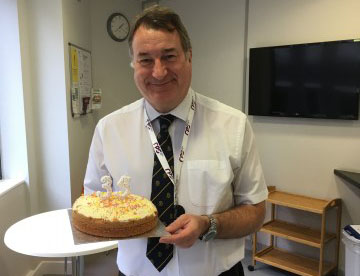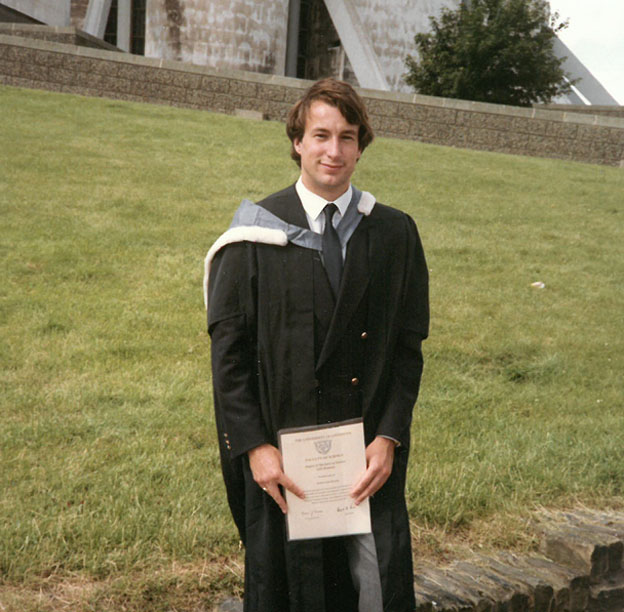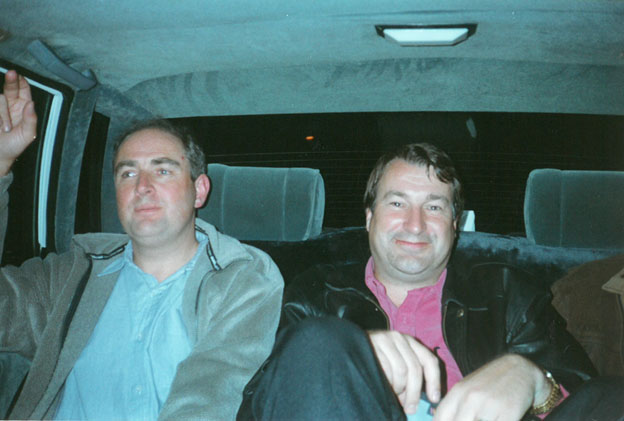As Andy Kirchin celebrates a big career anniversary, it seems like a good time to learn more about his career path, the evolution of the energy sector, and future uses of valuable oil and gas and subsurface skills.

How did you start your career?
I graduated from the University of Liverpool in the mid-80s with a degree in geophysics and geology. The oil and gas market had just tanked, as it does from time to time, and I joined a small boutique oil and gas consultancy called Scott Pickford as a Technical Assistant (TA) in what was known as the “dig’ing room” [an office that digitised maps and interpreted seismic sections]. It wasn’t what I’d envisioned during my last year of university when I was being courted by the BPs and Shells of this world, but it was an early learning moment that “timing is everything”! And I was lucky – the TA progression at Scott Pickford was the most fantastic apprenticeship in learning the nuts and bolts about how subsurface models are actually created from various data manipulations on computer programs such as “CPS” and “Zycor” (at the time) – and, importantly, what you can get wrong (with consequences) if you don’t understand those nuts and bolts. I’ve carried those lessons with me throughout my career.

Andy Kirchin, recent graduate
What was your career path into, and with, RPS?
I’m often put forward as the ‘poster child’ for demonstrating what’s possible within RPS in terms of career development! I set myself the target of being Scott Pickford’s ‘Technical Director’ by the time I was 35. Though the timing was a fluke, the announcement that I was to become Managing Director of Scott Pickford, by then part of Core Laboratories (CoreLab), came two days before my 35th birthday.
An industry contraction starting in 1999 made this an “interesting” time to take my first steps in “serious” management circles. It was a tough two years before CoreLab retreated from the integrated reservoir modelling concept they were pursuing to refocus on their ‘core business’ (forgive the pun!) The consulting division of Scott Pickford was sold to a UK company, ECL. ECL-Scott Pickford was then acquired by RPS in September 2005. I began to carve out a part-technical, part-management role in the newly growing energy business.
In 2010, I was asked if I’d consider going abroad to help build the consulting business elsewhere in the world, originally in Australia but then in Houston in 2011. We had three great years of building the business and my knowledge of who we had around the world and where meant I could take meaningful strides in integrating our business globally.
In 2016, I took on the Managing Director (MD) role for our training division globally, as well as the North American advisory group. Learning another business almost from scratch was another fast-learning experience. In 2018, RPS globalised our energy segment and I picked up the MD role for the North American energy group, where I also got to learn about the MetOcean business: this still has a special place in my heart as I find it fascinating.
In 2019, I agreed to step back into the advisory business as the global MD for the technical, training and advisory (TT&A) team, where I still sit on the leadership team for our energy segment and report directly to John Tompson, CEO of the energy segment. Not bad for someone who started as a TA working in a converted corner shop [Scott Pickford’s “dig’ing room”] in Croydon in 1987! Work hard, be open to new things, join the dots and look for how you can help make connections that create new solutions to problems that matter, and the world is your oyster at RPS.
What changes have you seen in your sector over the last 35 years?
Back in the late 80s, in the back of the converted corner shop on Croydon High Street, we had two Gould computers that each had two (count them…yes, two!!) twin CPU processors that were literally ‘state of the art’. (NASA was using the same computers at the time.) We had HUGE disk storage capabilities with ‘massive’ 80 MB drives that sat like a row of spin dryers in the computer room. You had to be fit in those days, as to change them out required unlocking the top and hoisting out about a hundred pounds of metal and putting a new one in. As I type on my 240 GB laptop, I sometimes ponder that to have the same storage in our computer room, it would have to have been about 3,000 sq m (the best part of 10,000 sq ft for my American colleagues)!
I’ve been lucky in my career that I’ve always been part of a pretty diverse working team. However, I know from talking to some of folks I met when I first went over to Houston that the oil and gas industry in Texas was less inclusive in its early days than perhaps Europe was at similar points in history. That seems to have improved now and RPS has certainly played its part in that improvement.
How is RPS positioning itself for the future?
How does an old ‘oily’ manager see a future in this rapidly changing world? To answer that one, I revert to one of the things I have learned throughout my career: change can be challenging, but in answering the challenge lies huge opportunity.
In my role as global MD for TT&A, I see my role as ‘helping our clients to adjust to, and thrive, in a low carbon economy’. We’re in a great place to do so at RPS. The old business of Competent Person’s Reporting (CPR) and/or due diligence for energy companies wishing to raise finance for their projects is adapting to the influence of Environment, Social and Governance (ESG) constraints, including Equator Principles 4 climate change mitigation, RPS has tremendous expertise in that field.
Carbon Capture and Storage (‘CCS’) is an essential element of the need to reduce greenhouse gasses in the environment if the Paris Agreement is to be reached. Our subsurface skills (that we learned in oil and gas) have an obvious application to geological storage, but when you look at the value chain and lifecycle of CCS, so much of what RPS can do is directly relevant to nearly every project and across almost the whole lifecycle. We’re working on organically joining that up and, far from seeing skills from oil and gas being sidelined, we’re becoming more and more relevant. Our training business is forging into the world of self-paced learning that will suit the next generations of learners as they enter industry, and we’re diversifying our subject matter expertise into CSS, geothermal, offshore wind, underground gas storage for power and Protected Species Observer (PSO) training. Energy security has become the “buzzword of the day” in recent weeks and months, but where RPS stands to add real value is “sustainable energy security”.
You are described as a great mentor and someone who understands the value of this in employee development. Who were some of your own mentors and what did you learn from them?
I was lucky enough to be taken under the wing of Ian Linnett, who was the senior computer mapping geo for Scott Pickford. He taught me the importance of planning and recording technical progress against a plan, in what could be a very long and complex series of interactions between “grids” of either time, depth, velocity, reservoir property, etc. Ian is also still with RPS (entering his 41st year!) and we enjoy swapping war stories (particularly over a pint!) of the crazy and amazing things we have seen in our careers.

Ian Linett (left) and Andy Kirchin (right) on the road
I was also lucky enough to be mentored by Don Scott (the Scott of Scott Pickford). It would be true to say that Don’s mentoring style could test whether you were ready to sink or swim in sometimes highly pressured situations with clients! I learnt a lot, though, and I try to make some of that experience available to anyone that is interested today (although I’d like to think I’m not quite as tough as Don could be!)
How would you sum up your career at RPS?
It has been an amazing 35 years and I have enjoyed (just about) all of it! I guess that is a prerequisite in order to stay in one place for as long as I have. During those years I have seen many changes and developments within RPS and I can confidently say that we’re working for a company that’s going places, establishing its identity and what it wants to be and represent. The evolution will continue, I’m sure, but after 35 years I like what I see!
KeyFacts Energy Industry Directory: RPS Energy l KeyFacts Energy: Energy People
 KEYFACT Energy
KEYFACT Energy